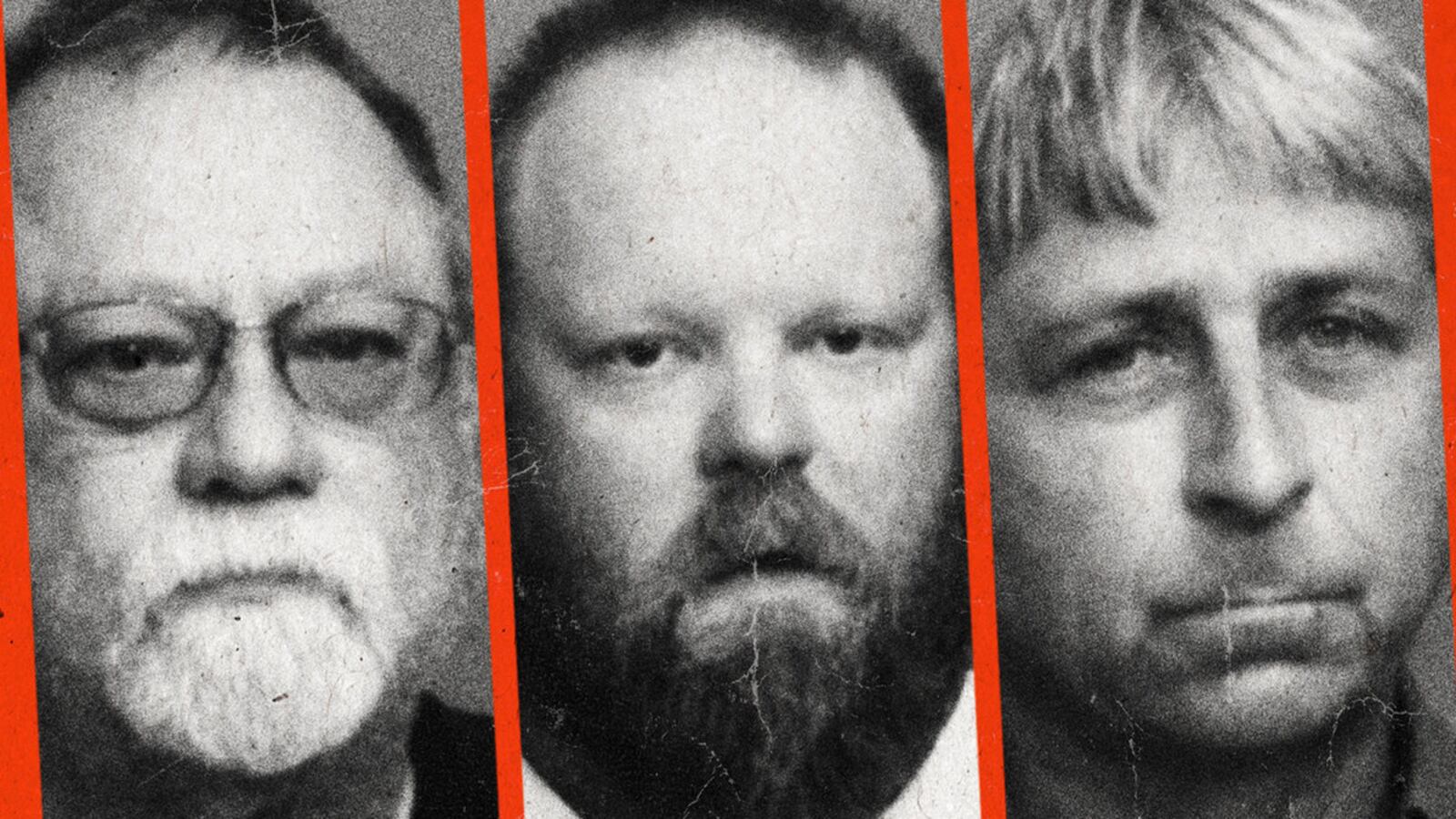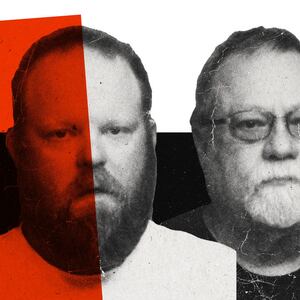The three white men convicted of murdering Ahmaud Arbery in Georgia in February 2020 have been sentenced to life in prison—and two of them will never be eligible for parole.
Gregory McMichael and his son Travis were sentenced Friday to life in prison without the possibility of parole, plus an additional 20 years, for the Feb. 23, 2020, slaying of the 25-year-old Black man. Their neighbor, William “Roddie” Bryan, received a life sentence with the possibility of parole after Judge Timothy Walmsley concluded that he is the only person who has shown remorse for Arbery’s death.
The trio were all found guilty in November on charges including felony murder in a case that drew national outrage weeks before the police murder of George Floyd set off a wave of protest against racist cops across the country.
Before announcing his sentence, Walmsley sat silently for a minute in a nod to a “fraction of the time that Ahmaud Arbery was running in Satilla Shores,” the neighborhood in Brunswick, Georgia, where he was killed. While there were no loud outbursts as the trio’s sentences were being read, reporters inside the courtroom said Arbery’s parents cried. Greg McMichael leaned back visibly shaken in his chair after his son was sentenced.
“I kept coming back to the terror that must have been in the young man running through Satilla Shores,” Walmsley said, noting that Arbery was chased for about five minutes.
Prior to the sentencing, family members of Arbery spoke in court to argue for the maximum sentence for a criminal case that almost never started. It took 73 days, a damning video going viral, and allegations of prosecutorial misconduct before arrests were ever made.
“Not only did they lynch my son in broad daylight, they killed him doing what he loved more than anything—running,” Marcus Arbery said in court. “I pray that no one in this courtroom ever has to do what we had did and bury their child. There is no words for that because no words knows that much pain.”
Wanda Cooper Jones, Arbery’s mother, held back tears as she said the trio “each have no remorse and do not deserve any leniency.”
“This wasn’t a case of mistaken identity. They chose to target my son because they didn’t want him in their community,” she added. “They were fully committed to the crimes, let them also be fully committed to the consequences.”
Leigh McMichael, Greg’s wife and Travis’s mother, was not present on Friday. According to reporters in the courtroom, a defense investigator said she “couldn’t handle” the sentencing hearing.
Throughout the almost three-week trial, prosecutors argued Arbery was on a jog through Satilla Shores when the McMichaels and Bryan chased him down the street after baselessly suspecting him of burglary. Travis McMichael, the only defendant found guilty of every count against him, was caught on video footage filmed by Bryan firing the fatal shots.
“These are men who should have known better. Vigilantism always goes wrong. You wait for the professionals to show up,” Senior Assistant District Attorney Linda Dunikoski said Friday.
Dunikoski asked for the sentence of life in prison without the possibility of parole for the McMichaels—but noted that prosecutors were requesting the parole possibility for Bryan.
The defense maintained that the incident was the result of an attempted citizen’s arrest on Arbery in connection with suspected break-ins in the area. Travis McMichael, who was the only one of the three defendants to testify on his own behalf and admitted Arbery never explicitly threatened him, nonetheless insisted to the jury that he fired his weapon because he believed it was “a life and death situation.”
“As thoughtless or reckless as these actions may have been, they are not evidence of a soul so blackened as to deserve life with no parole. This was a fight over a gun that resulted in Mr. Arbery’s death,” Bob Rubin, the defense attorney for Travis, said Friday.
The conviction against the trio notably came after the 12-person jury did not hear any evidence from prosecutors about allegations that Travis McMichael called Arbery a “fucking n-----,” as Arbery laid on the ground with several gunshot wounds. Nor did they hear about a Confederate decal on the truck used by the men in the chase.
While the relatively muted role of race may have been a strategy in the face of a nearly all-white jury, those issues will likely be at the center of a separate federal hate-crime trial of the three men beginning next month.
Lee Merritt, the attorney for Wanda Cooper Jones, told reporters on Friday morning that the Department of Justice approached the family with a plea deal for the federal case for the McMichaels—but they passed on the offer. The deal, according to Merritt, would sentence the father and son to 30 years each if they admitted the 2020 incident was motivated by hate.
“[Arbery’s mom] rejected that offer because we believe that today the state will move forward with life sentences without the possibility of parole, and we think that’s the appropriate sentence,” Merritt added to CNN prior to the sentencing.
In what was perhaps the most critical point in the trial, Travis McMichael testified to tell his “side” of the circumstances that resulted in Arbery’s death. Over two days on the stand, he talked about how he felt qualified to help with the crime problem in his neighborhood because of his previous law-enforcement training in the Coast Guard. Part of the training, he said, included learning de-escalation strategies that, he claimed, included pointing a gun at someone.
“It was the most traumatic event of my life. I was scared to death,” McMichael said. “This was the most traumatic event I’ve been through in my life.”
One Glynn County police officer testified during the trial that Gregory McMichael admitted he yelled, “Stop, or I’ll blow your fucking head off” to Arbery during the chaotic chase. Travis McMichael testified he got out of the car to confront Arbery, who he claimed grabbed for his gun during a struggle.
“He had my gun. It was obvious that he was attacking me and if he’d have gotten the shotgun from me, it’d be a life and death situation,” McMichael testified.
Dr. Edmund R. Donoghue, a forensic pathologist at the Georgia Bureau of Investigation, testified that Arbery endured multiple gunshots at very close range—including wounds to the chest, wrist, and armpit. Donoghue determined that the wounds—which were captured on Bryan’s now-infamous footage of the incident—were fatal and there was nothing emergency responders could have done to save Arbery's life.
On Friday, civil rights attorney Benjamin Crump, who represents Arbery’s father, commended the sentencing and argued that the punishment was a sign of progress in America.
“But we are not done,” he added in a statement. “We must continue to demand better from law enforcement, from our justice system, and from our society as a whole.”







